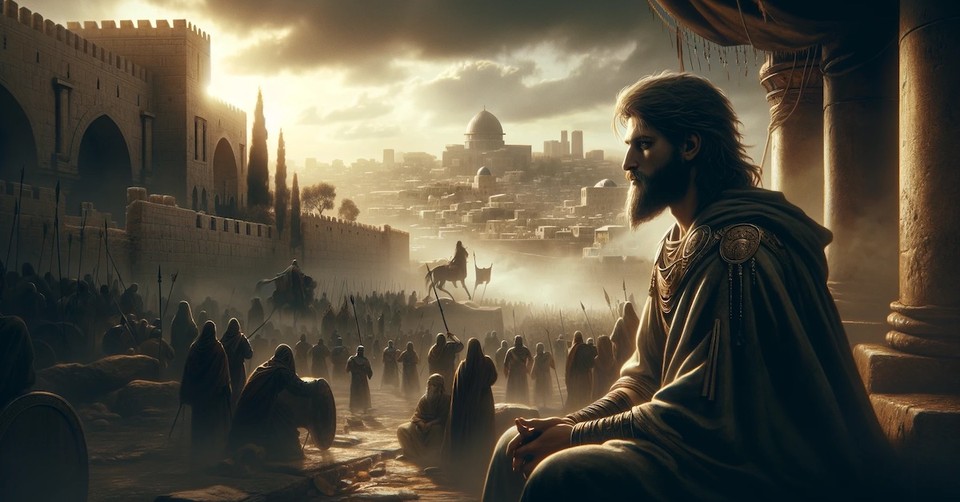5 Surprising Lessons from Uriah the Hittite

Uriah the Hittite was one of King David’s mighty men. The Bible depicts him as a fierce warrior and an upstanding man. However, Uriah faced an untimely end when the king lusted after Uriah’s wife.
Though Uriah was eclipsed by King David and by his wife, Bathsheba, we still can learn much from this upstanding foreigner who served his king faithfully—even unto death.
Who Was Uriah the Hittite?
Uriah is first mentioned in 2 Samuel 11:3 when King David inquires after Uriah’s wife. However, there is more to Uriah than just an unfortunate husband.
1 Chronicles 11 and 2 Samuel 23 list Uriah as one of the 30, an elite group of “mighty warriors” or “mighty men” who served King David. Both chapters include the legendary exploits of these fierce and loyal men.
The rest of the information we gain about Uriah comes from 2 Samuel 11. At the time, Uriah is off with the king’s men and the army fighting against the Ammonites. When David later calls Uriah back from war on pretense in 2 Samuel 11:9-11, Uriah shows his loyalty and integrity:
“But Uriah slept at the entrance to the palace with all his master’s servants and did not go down to his house. David was told, “Uriah did not go home.” So he asked Uriah, “Haven’t you just come from a military campaign? Why didn’t you go home?” Uriah said to David, “The ark and Israel and Judah are staying in tents, and my commander Joab and my lord’s men are camped in the open country. How could I go to my house to eat and drink and make love to my wife? As surely as you live, I will not do such a thing!”
From what little we know, Uriah the Hittite was a mighty warrior, a loyal soldier, and a man concerned with honor.
What Does the Name Uriah Mean?
Uriah might be more accurately transliterated from Hebrew as “Uwriyah.” It roughly means “Yah (God) is light” or “Yahweh is my light.”
We don’t know if Uriah was given this name at birth, or whether he later chose it for himself. Interestingly, it is a distinctly Hebrew name, specifically referring to Yah or Yahweh, the Hebrew name for God. This is of note since Uriah was a Hittite.
This name suggests that despite his Hittite heritage, Uriah was a follower of Yahweh.
The Biblical Story of Uriah the Hittite
The majority of Uriah’s story takes place in 2 Samuel 11.
At this time, King David was king of Israel. King Saul, Israel’s first king (and a bad king) no longer ruled, and David had brought Israel into a time of prosperity and military strength.
David was specially chosen by God to be king. He was described as “a man after God’s own heart” (1 Samuel 13:14, Acts 13:22). It seems that Uriah would have nothing to fear as one of the elite 30 serving under King David. Everything should have been all right…if David hadn’t seen Uriah’s beautiful wife, Bathsheba.
The trouble begins in 2 Samuel 11:2. David’s army had gone off to fight the Ammonites, Uriah with them, but David remained in Jerusalem. While walking on his roof one evening, he spotted a beautiful woman bathing.
That woman was Uriah’s wife, Bathsheba. She was taking a purifying bath, as per the law of Moses (2 Samuel 11:4). Clearly, she had no intention of seducing the king. But David sent messengers to inquire after her. Despite the fact that the messengers told him she was Uriah’s wife—a man David undoubtedly knew personally because of Uriah’s position as one of the 30—David had Bathsheba brought to the palace and slept with her.
The prophet Nathan’s rebuke of David’s behavior in 2 Samuel 12 suggests that Bathsheba was Uriah’s only wife (2 Samuel 12:3), whereas David the king had many (2 Samuel 12:8-9), making David’s offense even more appalling. But Uriah, off at war, had no idea this was occurring.
Things then went from bad to worse when Bathsheba sent word to David that she was pregnant (2 Samuel 11:5). David came up with a plan to cover up his sin and sent for Uriah to come home from the war front. David treated Uriah as if he simply wanted updates on how the war was going, asking after the commander, the soldiers, and the war. Then he told Uriah to go home and rest (2 Samuel 11:8).
However, David’s plan didn’t work. Uriah didn’t go home but instead slept at the entrance to the palace with David’s servants.
David’s plan had depended upon Uriah not acting in honor; men of David’s company kept themselves holy during active campaigns through abstinence (1 Samuel 21:4-5). However, Uriah abstained, saying, “The ark and Israel and Judah are staying in tents, and my commander Joab and my lord’s men are camped in the open country. How could I go to my house to eat and drink and make love to my wife? As surely as you live, I will not do such a thing!” (2 Samuel 11:11).
Even when David tried again by getting Uriah drunk, Uriah did not go home to sleep with his wife and still stayed with the servants. David then turned to drastic measures.
How Did Uriah Die?
Since David couldn’t pass his child with Bathsheba off as Uriah’s, instead of confronting his sin, he decided to have Uriah killed.
David sent Uriah back to the front and sent a message to the commander-in-chief of the army, Joab, saying, “Put Uriah out in front where the fighting is fiercest. Then withdraw from him so he will be struck down and die” (2 Samuel 11:15).
Joab did as David said. He put Uriah in a place where he knew the strongest enemy defenders were, sending him to attack the wall of the besieged city. There, Uriah was killed, most likely by missives fired from the wall (2 Samuel 11:20).
5 Surprising Lessons from Uriah in the Bible
Uriah’s story reads like a Shakespearian tragedy. A good man’s honor brings about his own downfall, while a wicked king gets away with it—or does he? There are surprising lessons to be learned from Uriah’s life.
1. God Accepted Gentiles Long before Jesus’ Resurrection
Sometimes, we might think of God’s favor extending to the Gentiles (non-Jews) as something that doesn’t take place until the New Testament with Peter’s dream about the clean and unclean animals (Acts 10). However, God had laws in place long before this allowing devout foreigners to become worshippers.
There were extensive laws about who could assimilate and what had to happen, and certain people groups could never achieve full status in the community, but Israel was meant to be a shining light to all the nations (e.g., Isaiah 49:6).
Uriah was a Hittite, a nation historically antagonistic to God’s people. However, we see from the above passages that he was a man of honor and one of David’s most trusted warriors.
2. Doing the Right Thing Doesn’t Always Mean Everything Will Go Well
Uriah didn’t do anything wrong. He served David faithfully. He loved his wife. Yet, the king stole his wife and had him killed.
Sometimes, we preach a prosperity gospel. “If you follow God, everything will go well for you!” But this isn’t true. Jesus says in John 16:33 that in this world, we will have trouble.
If you or someone in your life is suffering, this doesn’t mean it’s the result of sin (though sin can have consequences). Things in this life won’t always work out for us—the multitude of martyrs should make that clear. However, God is ultimately a just and loving God, and those who follow Him will find eternal joy and everlasting life.
3. God Uses Broken People
David was called a man after God’s own heart (1 Samuel 13:14). He is extremely important to the line of Christ and the history of God’s people. Meanwhile, Uriah was a Hittite, a Gentile.
Despite this, the Bible paints Uriah in a positive light and unflinchingly details David’s sin against Uriah, Bathsheba, and God.
David was no perfect man. The story of Uriah clearly shows this. However, God still used David to do great things. Over and over, the Bible shows God using the weak, the broken, and the sinful to do his will. From adulterer David to murderous Paul, God shows His power by using the least likely candidates to accomplish his will.
4. You Can’t Hide Your Sin from God
Uriah was dead. David married Bathsheba. It seemed he had succeeded in covering up his sin.
But God still knew. He sent the prophet Nathan to confront David. Nathan told David a story about a man who took another man’s sheep, even though the first man had plenty of his own, and the second man only had one. David was livid and demanded justice for the man. Nathan replied, “You are the man!” (2 Samuel 12:7)
Because of David’s sin, terrible things happened.
“‘You struck down Uriah the Hittite with the sword and took his wife to be your own. You killed him with the sword of the Ammonites. Now, therefore, the sword will never depart from your house, because you despised me and took the wife of Uriah the Hittite to be your own.’ “This is what the Lord says: ‘Out of your own household I am going to bring calamity on you. Before your very eyes I will take your wives and give them to one who is close to you, and he will sleep with your wives in broad daylight. You did it in secret, but I will do this thing in broad daylight before all Israel.’… “Because by doing this you have shown utter contempt for the Lord, the son born to you will die” (2 Samuel 12:9-12, 14).
All of these things came to pass. Bloodshed marked David’s rule. David’s son Absalom rebelled against him and publicly slept with David’s concubines to assert his kingship (2 Samuel 16:22). And the son Bathsheba carried died.
David could not hide his sin from God. All of his power and cunning came to nothing.
5. God Can Use Terrible Things for Good
The story of Uriah, David, and Bathsheba is a tragic one. However, even in the midst of the sin, death, and betrayal, God was preparing good things.
David and Bathsheba’s first child died. However, their second child was Solomon, the wise king. Solomon is listed in the lineage of Jesus. Though what happened to Bathsheba (and Uriah) was terrible, her son would be part of the lineage of Christ, the Savior of the world, who would break the chains of sin and death.
Uriah’s story reminds us that God is always at work, no matter the circumstances.
Photo credit: ©GettyImages/Massonstock

This article is part of our People from the Bible Series featuring the most well-known historical names and figures from Scripture. We have compiled these articles to help you study those whom God chose to set before us as examples in His Word. May their lives and walks with God strengthen your faith and encourage your soul.
4 Things You May Not Know About Abraham in the Bible
20 Facts You May Not Know About Moses from the Bible
Who Was Mary Magdalene in the Bible?
Who Were the 12 Disciples of Jesus?
Who Was Isaiah & Why Was He Important?
Originally published December 17, 2020.





